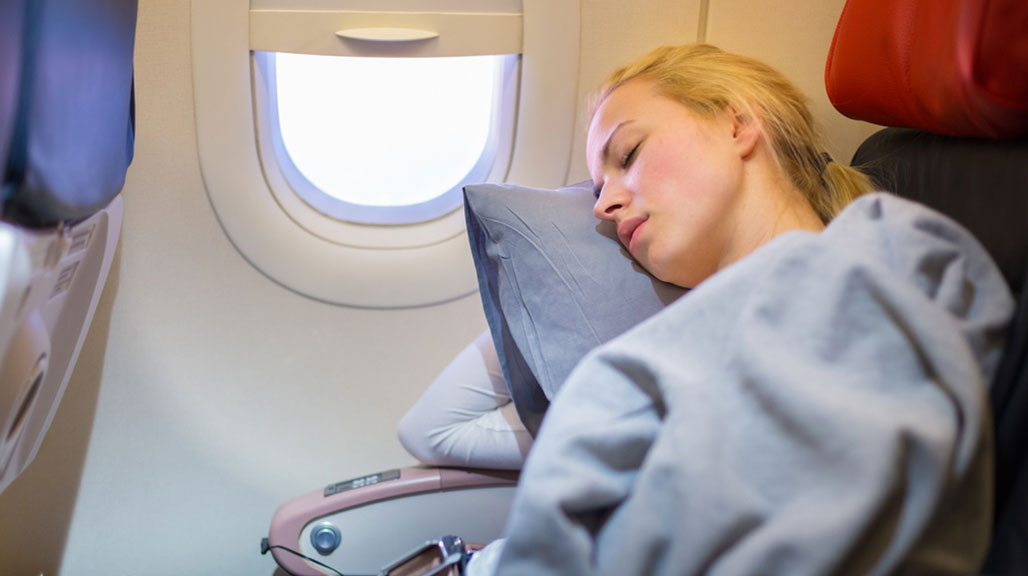Travelling For Work Or Leisure Doesn’t Have To Be A Pain In The Neck
 Contributed by
Dr Gary Tho
April 4, 2017
Contributed by
Dr Gary Tho
April 4, 2017

Flying to your favourite destinations this festive season? Although you may be making your friends envious, your body is probably thinking, “No!! Not another long flight, cramped leg space, dry skin, back ache, bland food, and jet lag!”
You may have worked out your game plan – a neck pillow, ear plugs, and an eye mask. And yet those stiff shoulders, neck aches, or back pain still haunt you. Prolonged sitting and poor posture can cause plenty of discomfort, especially when you add on the pressure, humidity, and cramped conditions of an airplane. If these poor posture habits are not changed, the discomforts will soon turn into pain – ruining your holiday plans.
So what can you do to prevent the unnecessary suffering? Keep our handy ABC’s with you when travelling for work!
Practice The A-B-C’s Of Happy Travellers – And Travel Pain-Free Forever:
A – Air Travel
Although sitting is easy, our bodies are made to move. So getting up and walking around works wonders for stiffening joints and tight muscles. It will help promote blood flow, and stretch and relax aching backs and stiff necks. If you are stuck in the window seat and prefer not to make enemies every time you want to go for a walk, try contracting and relaxing the various muscles in your body. This, combined with walking and flexing your feet up and down and round in circles, can also help prevent swelling in your legs caused by blood in your legs and feet being unable to return to your heart.
When sitting, a small pillow or rolled towel in the arch of the neck and lower back will help reduce muscle strain and encourage more optimal position of your spine. Poor posture can shift your spinal alignment, and commonly cause pain in the neck, back, and buttocks!
B – Bags
Bags for our personal belongings and shopping are essential. Using lightweight handbags or shoulder bags allows us to keep our essentials and valuables with us at all times, and without the extra neck and shoulder strain. Stay away from full leather bags, which even when empty weigh a tonne – let alone when it’s full.
For cabin and check-in luggage, lightweight, durable luggage with good wheels are now the norm, and for good reason. A light suitcase allows us to carry more, and having good wheels means we don’t have to work so hard at pulling or pushing them. One trick to remember is to use two smaller bags instead of one massive bag. This will save your shoulders and back from excessive strain, and the baggage handlers would very much appreciate it too!
C – Carrying
Carrying our bags into cars and taxis or up and down stairs can also a risky task. Many people have ruined holidays because of lifting and carrying injuries. Remembering these important points can help prevent serious injury to your spine:
1. Carry heavy items as close to the body as possible (Don’t reach for your bags!).
2. Avoid twisting and lifting at the same time. Move and shuffle your feet!
3. Bend at the knees to pick something up and use your leg strength to lift. We have two legs but only one back, so using your legs will be easier and safer!
D- Drink (More Water)
Our body gets dehydrated because of the low humidity level in the cabin. This affects us more if we’re travelling from Asia, like Singapore which has much higher humidity levels. Our mouth, throat, lips, and skin dry out, which can leave us feeling (and looking) crappy – and also make us more susceptible to getting sick!
So make sure you drink lots of water (a little at a time, consistently) and be mindful of drinking too much coffee or alcohol, which can help dehydrate us faster.
E – Exercise
We all know that exercise is good for us. And that’s why it’s even more important when we travel. Firstly, exercise is a useful way to keep your weight in check while you’re feasting on exotic foods and cheat meals. It may not burn off every calorie you eat, but every little movement will help.
Besides keeping you looking great, exercise can help you feel great too. Exercise can help us sleep better. Exercise helps to burn off stress and tension in the body, so you can relax at night. Exercise is a simple way to help us beat jet lag. Exercising at the same time you’d exercise at home may help our body balance the mismatch between our internal clock and our new time zone.
Try some simple exercises in your hotel room like jumping jacks and shadow boxing. Or be creative and do a mini circuit training comprising of push-ups, squats, lunges, side planks, mountain climbing, and tricep dips. Do maximum reps of each exercise in 30 seconds and repeat three rounds.
Wrap Up
An enjoyable holiday with no limits is what we all deserve. Following our simple, pain-free ABC’s will get you smiling even more on your holiday. Have a safe and exciting festive season filled with smiles, hugs, and plenty of photos.
*If all else fails, all my frequent-flyer clients would agree that coming in for a chiropractic adjustment a day or two before your flight and on the first or second day when you return does wonders to keep you feeling your best, being your best, and enjoying your well-deserved holiday!
This post was first published on Dr. Gary Tho’s Chiropractic Works blog and has been reposted on Connected Women with the permission of the author.
Edited by Michelle Sarthou
Image Credit: Shutterstock
Did you enjoy this post? Please comment, like and share!











Sorry, the comment form is closed at this time.